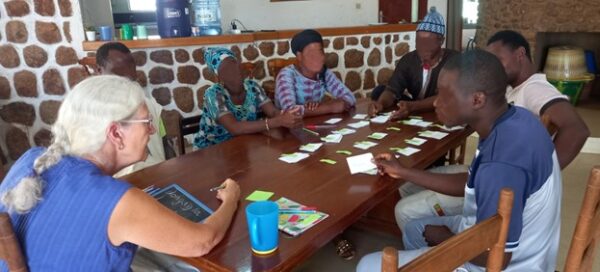
Do you remember the messed-up English sentence that was the title of my last blog post? It was to show you the challenge we were facing at our vowel party in Senegal and to ask for your prayers. Now I am here to say thank you for your prayers and that Iʼm safely back home!
Over the course of 14 days, we played with vowels – looking at every vowel in about 1200 words, listening to it and comparing it with other vowels at least two or three times. That is what is going on in the picture above – they are sorting the words, on little papers, by vowel. (I don’t know if you can see how many piles there are in the picture – there are 21 piles, representing the 21 vowels they have. Yikes! Though, by contrast, My Language has 28. Double yikes!) And over the course of the 14 days, the words got corrected on their little papers and the spelling of the language became cleaner. Now the translator and her co-translator have a lot of work to do in correcting all of that in the dictionary and the whole New Testament (and portions of the Old Testament) – you can keep praying for them as you think of it!
At one point in time we got rather stuck, not knowing if two sets of vowels were the same or not. So we recorded a bunch of words with those vowels in them and sent the recordings internationally. One set went to Adama*, one of My People here in My Country, since in My Language we have the distinction between those vowels that were confusing us there. He listened to them and said that yes, according to his ears, there was the same distinction there, and he told me which ones were which. Another set of the recordings went to a professor/friend of mine in the US (thanks, Katie!), who ran tests on the sounds waves in the computer (using a computer program called Praat), and the computer agreed that there was a distinction between the vowels, also telling us which ones it thought were which. And guess what – a few days later, when we tried looking at those vowels again, we saw that Adama, Katie and the computer, and our participants all agreed! It was an encouragement to know that we weren’t just shooting in the air but that what we were finding did actually line up with what other methods would say as well. Whew!
By the end we looked at some of our words in sentences, and we saw some of why the vowels had been so difficult for years. For example, every noun ends with the syllable =na. But in a sentence, that =na disappears, and the disappearing act affects the vowel right before it, and, just for the fun of it, other vowels in the word. So where I had told you that they didn’t know if vowels in certain words were like the vowel in bet or bait, I see that they had good reason to not know – if you just said the word in isolation, it could have the vowel in bait, but when you put it in a sentence it gets the vowel of bet. Crazy!
Anyway, I’m such a nerd that I could go on and on, but I don’t want to bore you with the details. I did, however, want to thank you for praying. The translator has enough to get her moving forward again, after having feeling stuck on this problem for years. So praise the Lord (about the moving forward part, not necessarily the being stuck for years part)!
* Name changed for security reasons
Sure love that nerdy brain God blessed you with dear Susie! In His hands for His Glory!